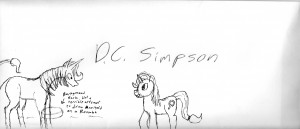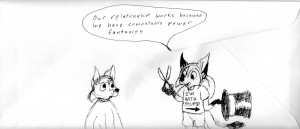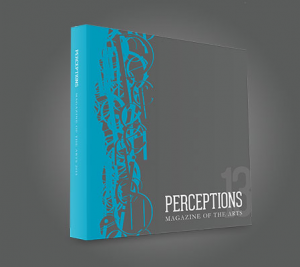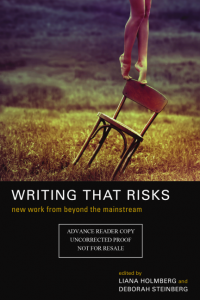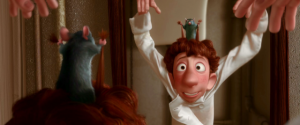Posts by Sharif
Over Burdened: Comic-Con, Southern California Review, and School
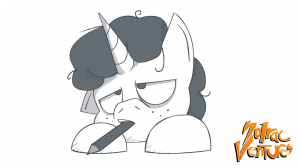
My OC Iambic Hexameter is exhausted with all the writing he has to do lately. Drawing by Kreid from Solrac Ventures
I have been more productive in the past few weeks than I have been in the last few months combined. That would be a good thing if it wasn’t so exhausting. Also, I’m kinda an agnostic Muslim, but I still play Ramadan. So all this work and thinking and stuffs has been while not eating or drinking while the sun is up. I’ve had to cheat on some days.
I fasted throughout Comic-Con so that I could get some extra Allah blessings as I ran up and down the San Diego Convention Center trying to get copies of the Southern California Review to select cartoonists that I respect. Since the other editor-in-chief and I have made the decision to start adding literary art comics as one of the genres that we publish.
I’m still waiting to hear back from most of the comic artists, whom I’ve been e-mailing individually, whom I’m also giving a month until I consider myself blown off and try for others.
So far we’ve confirmed Dana Claire Simpson, the artist behind the finished web comic Ozy and Millie and currently her syndicated comic strip Heavenly Nostrils which you can read for free on gocomics.com.
We have a tentative not completely a yes, but more like a probably from Nate Powell, graphic novelist who made Swallow Me Whole, Any Empire, and just released the first volume of a graphic biography about Civil Rights icon Congressman John Lewis called March.
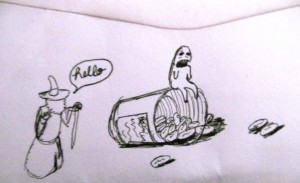
Swallow Me Whole Fan Art. I won’t show the reverse side because my Any Empire artwork came out terrible…
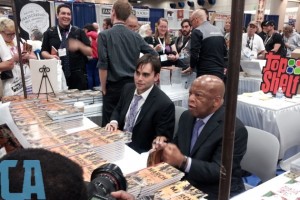
Comic Alliance actually took a picture of me talking to Nate Powell about the Southern California Review. (Top Left: Me, Top Middle: Nate Powell, Middle: Andrew Aydin, bottom right Congressman John Lewis
I wanted to have time to personally draw fan art and make a personal letter to each cartoonist explaining why I was a fan, why we were interested in their work, and why their involvement in Southern California Review would be important. I hated soliciting work as poetry editor, because I couldn’t really do things like this to show how sincerely I liked the poets work. I don’t like mass letters. I like a personal touch, but it takes a lot of time. I drew these envelopes while in a laundry mat the day before I left for Comic-Con.
Last weekend I took a television writing class taught by a writer on the Simpsons, Michael Price. Which was both fun and time consuming. It really taught me a lot about working in a writer’s room and really got me over my fear of them. This is something I’ll probably write about when I have more time. Doing this class right after doing a killer revision of a short story was creatively draining. I mean I literally finished the draft at 8AM after an all-nighter, took a shower, and drove to USC to attend this all day class which got out at 4.
But right now I still have a 6 page homework assignment to turn into that class, and I have a ton of reading to do for my thesis adviser, who I don’t think is too happy with my last revision of my short story. Her e-mail had a “We need to talk” vibe to it.
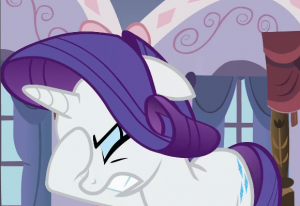
This is a real facehoof if you read my previous post.
The Art of the Dress: Lesson on Criticism
As I write this I am recovering from Comic-Con and battling against a deadline where a short story wrote needs to be second final drafted. After meetings with my adviser she had told me a lot of her comments verbally, and we were largely on the same page. I was shocked to see that on the written pages there were way more notes, and it was worse than I had thought.
Before we get started, any bronies and non-bronies might want to (re)watch the first part of the song to get the context of this post.
I had a little too much fun writing this story. I added a lot of avant-garde elements that were definitely too experimental. Some of the tools were things like excessive footnoting, the pretense of the story being historical fiction from the future about our times, animal dialects, pop culture references, sci-fi fantasy sequences, and treating animal languages as being tools manufactured by their perception of the world (my take on the Whorfian Hypothesis).
It was fantastic for a writer like me who loves the social sciences to create the politics and social dynamics of this world. And just in terms of technique, and what I needed to earn was one of the most ambitious pieces I had ever attempted. The first draft was far from perfect, but considering how many ingredients for failure I threw into the mix, I dared this story to fuck up. Yet with theory I knew how to make it all work, or so I thought, or so I’m thinking.
Regardless of how this turned out, I had an incredible time writing it: minding the intimate details. It was like I was twirling around my room, carefully cutting all the pieces of the story and watching them magically twirl about until they formed something whole and beautiful.*
Then the song kicks up again, and we enter the nightmare stage.
There’s a lot of “This doesn’t work for me,” and “I’m not buying this element,” and “I think we should remove this.”
For the most part an editor’s job is to provide you with solutions and usually the easiest solution to make the piece work. My problem was that most of my experimentation doesn’t exist in your everyday story. So the easiest fix when it doesn’t work is “Remove it.”
My editor an I are both on a firm deadline from my writing program to have this revised and signed off by the end of the week. The story is a strong enough story to exist without the avant-garde bullshit. However, the story doesn’t feel right without it. So I was posed with a moral question. Do I just send in an obedience draft where I mindlessly do exactly what my editor wants just to meet this deadline and then change it back to what I want before I publish it? As Rarity puts it, “There’s simply not much time.”
But I thought about something a friend sent me about a month ago. She said that her screenplay pitch had gotten all these weird criticisms about changing the main character and other such things to the point where they were asking her to write a completely different movie. I took a look at her treatment and pitch and saw where the real problems were. It wasn’t that her story was the wrong story to tell, or that she had picked the wrong protagonist, but that her pacing was off. The central conflict was in the first act instead of the second act, which made it seem more like a different character should have been the protagonist. I told her:
…[O]ne thing I’ve learned is that the surest way to ruin something is to take criticism at face value.
This is Rarity’s mistake. She does exactly what her friends tell her to do. They end up ruining the dresses. Remember an editor’s job is to find what doesn’t work and find A SOLUTION. It is your job as a writer to see if this solution is practical. Also to see if the editor is actually solving the real problem.
Being able to take criticism is a skill that requires a lot of practice and patience. Some people act like being able to take criticism is just not crying when facing a lion’s den of a workshop. It’s not just being able to handle advice with grace and poise regardless of how tactless or rude it might be. It is about being able to improve your work and yourself despite the message or the messenger.
One thing that appears a lot in my notes is the phrase “When/Why does this happen?” Even though there are entire sections that actually address the whys and the whens in a pretty heavy-handed and obvious manner. My first reaction to comments like these were rage. My editor wasn’t reading closely enough. They weren’t paying attention! I did my due diligence here, but they ignored it and commented on me as if it was a fault in MY WRITING!
But then I thought, maybe that part was just boring? That’s why they missed it. That’s the real criticism. Instead of calling attention to details again, I just need to make the ones I put in more interesting so they will stay with the reader. Perhaps by improving the prose or with better imagery, etc.
So for the avant-garde elements of this story, I need to do the same thing. I can’t make Rarity’s mistake. This is my story. When people read it they will be seeing it as a test of what I can do as a writer. I don’t want to have my name on something I don’t believe in.
Remember, it’s about “balanc[ing] style with adherence.”
Read MorePoetry Publications (Brief Bragging)
People say that there’s no money in poetry. That’s reasonably true. Last year I’ve made about $75 publishing poetry. I’ve gotten 3 poems published in 2 places. I submitted to 20 places, giving me a 10% acceptance rate. I don’t mean to brag, but these are EXCEPTIONAL numbers. Yet, I wouldn’t be able to buy the new Animal Crossing and guide book with it.
The first publication took two of my pieces and is available now…I-I really don’t know how you get one though. There’s no place to buy it on their new website. Anyway, my poem “Fanajeen” won their poetry award and is on their website. They also published my poem “The Roomba Suicide.” Since you can’t buy it, and its been awhile, I don’t see anything wrong with doing this.
The first one will be released this fall in a print anthology by Red Bridge Press called Writing the Risks: Volume 1. It is a fledgling anthology from a fledgling press which celebrate writing that pushed the limits of the established paradigms of the writing business.
Read MorePremise Bias
A few years back I was in a bar with a couple of friends. M had just gone off to grad school and was giving us reports about the people in her program and their work. G was her bestest best friend at the time and had already heard all of the shit-talk. I was sipping a particularly well mixed snake-bite (half stout half hard cider); I put it down quickly and said, “Yeah, so what was so terrible [about their work]?”
M said, “Oh, my God, Sharif! It’s just so baaaad! I was wondering how they got into this program, you know?” G started giggling, already aware of the dirt. “One guy, wrote a poem about werewolves having sex.” G couldn’t restrain herself and burst out laughing.
I smiled, “So why was it bad?”
M restrained a yell, “It was about werewolves having sex!”
“And was it not done well?” I asked. G began to stop laughing.
M insisted, “It was about werewolves having sex!” M noticed that I wasn’t really amused, in fact I was judging her for closed-mindedness.
“Okay, well, hear this one! Someone wrote a poem about vampires!” She said a few more things and shot down her classmates, offering little more explanation than premises. As someone who writes high concept work like a stork who kidnaps babies (“Stork” in Writing That Risks to be released by Red Bridge Press Fall 2013) or a Roomba that kills itself (“Roomba Suicide” Perceptions Magazine of the Arts. Print only. 2013.) I had a feeling that they were indirectly trying to take digs at me.
I asked, “So what subjects can art be about and what subjects are not art?”
Where as M and I were writing students, G was an art/writing double major. While writing classes do not actually address the questions of “What is art?” art classes definitely do. G stopped laughing.
M was trying to regain her status and justify her remarks, “No, you just don’t do poems like that.” This was just like her, to say an opinion like it is fact and expect you to take it on her authority.
“What about a poem about a video game?” I asked. Sensing that this was a trap, she didn’t spring it. I sprung it on her anyway, “What if that video game was Sega Ghost Squad?” She knew I was referring to the poem by Colette Atkinson, our former professor at our university. “Ideas aren’t writing. Anyone can have ideas. It’s how you write them that determines if they’re good. Colette Atkinson used Ghost Squad very well to tell the story of a shitty relationship…Just because it’s not ‘high art’ doesn’t mean it’s bad.”
I’m not sure whether they were trolling me or not, but the discussion ended there.
I was reminded of this anecdote when I was talking on the phone with a writer in my program and friend Jonathan Rosenthal (Pound Puppies, Recess, Hey Arnold!). We were talking about the premise for Pixar’s “Ratatouille,” which is a great film. Jonathan said, “No premise is bad so long as it has a good answer to the question ‘And then what happens?'”
Seriously, that is such a FANTASTIC writing perspective that I’m going to quote it again:
“No premise is bad so long as it has a good answer to the question ‘And then what happens?'” -Jonathan Rosenthal
Looking at the premise for My Little Pony: Equestria Girls, it is a pretty awful premise.
Princess Twilight Sparkle must leave her land of magical talking ponies and become a human in the human world where she must become prom queen to win back her stolen crown.
It was so awful that people started throwing fits about it, and death threats were given to DHX (the studio that animates MLP). Before this similar hostility was given to MA Larson for writing the episode where Twilight Sparkle becomes a princess/god/alicorn. Yet after seeing the actual execution of these premises, people remembered that Megan McCarthy and MA Larson are actually pretty bad ass writers who can handle their shit.
A premise itself, is not enough to judge a work. If you are this closed minded you can keep yourself from writing the next great novel, or publishing it, or making it into that movie. Keep in mind that bronies should have never liked My Little Pony. They discovered that despite the genre, the premise, and the demographics, the execution of the show made it something more than just engaging, but heartfelt and powerful.
I really liked Spenser’s (Brony Clubhouse) video expressing his disappointment with the over reacting part of the brony fandom who should know better than to judge a work by the basic idea alone.
So let’s play a game. I’m going to put a list of premises/ideas of existing properties. Your studio has developed a reputation for producing terrible films. They hired you to try to turn the studio’s reputation around. You are authorized to make 5 properties, whether it’s a TV show or a movie, or whatever. You will not be working on the films, your job is just to green light the films you think will be the best. You must reject 5 ideas and go with the best 5 based upon their premise. Honor system. No cheating if you recognize the title. Remember, your studio is not concerned with money, but quality.
- Sex-changing martial artist finds himself having to deal with the challenge of having too many fiances while constantly having to engage his enemies on various forms of combat from martial arts Japanese tea-ceremony to ice skating martial arts fighting.
- A teenager takes a time traveling car back in time accidentally undoing the circumstances of his own birth.
- A teenage girl finds herself obsessively and dangerously in love with a monster hiding as a human, which is perfectly evolved to be irresistible.
- A bunch of high school kids from different cliques attend Saturday school together and learn they aren’t so different.
- A rat who wants to be a chef tries to achieve his dream by controlling a human who is hopeless at cooking by pulling his hair.
- Unlikely paranormal investigators must save the world from the upcoming apocalypse to be brought about by The Great Destroyer, who takes the form of a giant commercial marshmallow man.
- A bookworm studying magic is forced to study the magic of friendship in order to prevent the world from being cast in eternal darkness.
- The last members of a dying planet shoot their baby to a distant planet whose sun gives him super strength, speed, vision, and flight.
- After a failed attempt to drown himself in a river, a man finds himself stranded on an island in the middle of the city, where he uses trash to adapt to his new life.
- Things go wrong in a theme park full of dinosaurs causing a life and death situation for the people there.
BONUS: Teenage Mutant Ninja Turtles
Ranma 1/2: If you thought of making something with this premise and decided against actually doing it, then you’re not Rumiko Takahashi, at a point Japan’s wealthiest woman, who made a fortune off of Ranma 1/2 and Inuyasha. Both of these series are not just widely popular but are considered classics and a must watch for any anime enthusiast.
Back to the Future: The way I wrote that premise, I would not have made this movie and I love time travel…and cars. But the premise just sounded bad or at least like it could go bad at any moment.
Twilight: I have to say I would have put my money on making this. The premise sounds fantastic! But are these good movies/book? I’m of the popular opinion that they aren’t (even though I’ve only read a chapter or two of the books). That’s the reason I included it. To show that even a good premise with poor execution will make a bad movie. Really what we’re learning here is that a writer’s ability isn’t in his ideas, but how he brings them to life.
The Breakfast Club: This movie does not have a premise that would make me risk investing my money, but it’s a classic. It resonates with a lot of people…people who still live with their parents.
Ratatouille: This is the film that inspired this blog post. At least it inspired the conversation that inspired this blog post. After the movie was made someone at Pixar was lamenting how stupid the premise was, even though the film ended up being fantastic.
Ghostbusters: Proving that with humor you can really get away with a lot. One of the better TA instructors at UCI taught me that with humor, camp, self awareness, and lampshades you can make a really enjoyable work which gets away with anything. Ghostbusters not only gets away with murder with the Stay Puft Man, but they created one of the most recognizable scenes in cinema.
My Little Pony: Friendship Is Magic: Well, without someone buying into this premise, none of us would be here. I’d probably have a much more cynical blog where I’m just like every other jerk writer trying to establish some sort of platform for himself. I’d probably be trying to exploit my race or something. Anyway, without someone giving the magic of friendship a chance, we wouldn’t have followed Twilight Sparkle and friends. We wouldn’t have discovered that a world of ponies could be so rich with humanity.
Superman: Coming from one of the dumbest origin stories ever, Superman has become the icon of modern day mythos and American society. So goes America, so goes Superman. “Man of Steel,” possibly being the first film to crash airplanes in building since 2001, is really a film about the divided identity of America post 9-11. Speaking of “Man of Steel” I would argue that this film shows how a movie can be simultaneously excellent and terrible based on execution alone and not the premise.
Casaway on the Moon: This is a South Korean film, so of course they’re obsessed with the effects of capitalism and technology on the human individual. This film explores the human pain and loneliness while being surrounded by people. This is profound, powerful, creative, fun, moving, and on Netflix. It would be a shame if someone passed on this because of the premise.
Jurassic Park: Of course this film made a gagillion dollars. As a kid this was the only film I saw which traumatized me and made me afraid of getting eating by a T-Rex each time I went to the bathroom. If that doesn’t make a great film I don’t know what does…other than great characters, plot, tragic elements…
Bonus: Teenage Mutant Ninja Turtles: Enough said.
It’s natural for us to create patterns of what will be good and what won’t be. It’s to save us time and let us know that a movie about a hot tub time machine is a terrible idea. But keep in mind that good artists are not trying to just remake what has been done, but to break expectations and destroy the established paradigms. My Little Pony was done poorly a few times in the past. This My Little Pony is so great, because Lauren Faust broke paradigm after paradigm of what we expect from television for little girls. Unfortunately, premise bias is strong in the writing community and risk taking isn’t.
Read MoreHow To Do a Kickstarter: Sharif Acts Like Donald Draper on an E-Mail (Public Relations)
Just after posting about e-mails, I got an e-mail from a project I donated to. Now I’ve kinda recontextualized it from what it really was to being about a graphic novel called “Cupcakes: Rainbow Dash’s Revenge.” You know, to protect the innocent and such. This is not the actual letter, this is a tribute but it maintains the same attributes.
This e-mail was pretty well thought out from a business angle and followed many of the tips from How To Do a Kickstarter: E-mails. It gives the donors an update, it rallies the troops in the final hours of the campaign, and it even pushes for people to follow them on Facebook. If the timing was different I’d swear they had read my blog on e-mails.
However, they violated one of the don’ts I wrote about in that blog: “Most importantly, don’t make it all about yourself or your project.”
Now I know what some of you are thinking: “But if I’m e-mailing them, then they already donated. So what does it matter how I word the letter?” Well, because odds are this isn’t going to be your one and only Kickstarter. If you go back to the same well, you shouldn’t poison the waters.
Hey friends and family,
“Friends and family”? Isn’t this a bit assumptive? What if I’m someone who doesn’t know you who stumbled upon your campaign on Twitter? Now if feel marginalized and excluded. This also makes you look small time. Unprofessional. Also people get really offended by the use of the word “Hey.” I know it’s stupid, but so is why most people get offended about most things.
Hello friends of Cupcakes: Rainbow Dash’s Revenge,
That says all the things we want it to say without any of the things we don’t want it to say. It doesn’t say that we’re being bankrolled by our friends and family, and it includes everyone who has donated into a kind of club. I am a friend of this graphic novel. I belong. I feel special.
We’re happy to announce we’ve surpassed our fundraising goal for my graphic novel “Cupcakes: Rainbow Dash’s Revenge,” and I want to THANK ALL THOSE who’ve supported us either through donations and/or spreading the word. From the bottom of my heart, it means a lot to me!!
What I’ve done here is put all the words in bold which the Kickstarter is talking about himself and underlined the words in which the Kickstarter talks about the donors. Somehow we’ve made this all about ourselves and not about the people who made it happen for us.
Also this says “I want to THANK ALL THOSE…” except it doesn’t actually do it. The sentence literally just expresses a desire to thank, but doesn’t say “thank you.” Even the thanks is egocentric. It’s about what “I want” not about the donor.
By saying “thank all those” it emphasizes how this is a mass e-mail. When has a mass e-mail ever made anyone feel special? Imagine I invited the entire office for drinks. Now imagine I invited you for drinks. Which one makes you feel important to me? Let’s try:
Thanks to you and your donation the dream of “Cupcakes: Rainbow Dash’s Revenge” is becoming a reality. Your generosity has turned an idea into ink on paper. Whether by giving money and/or by spreading the word, you’ve not only helped create jobs for artists and writers but you’ve also helped spread a story which will captivate and inspire those who read it. I thank you from the bottom of my heart, because without you none of this would be real.
While “captivate” and “inspire” might not be the best words for “Cupcakes: Rainbow Dash’s Revenge,” all of this is entirely true. The difference is that I gave the donors a very real sense of importance, instead of focusing on myself.
In my version there are as many bold sections as the “original” version had in the FIRST SENTENCE. Also note how the diction creates a feel of passion and a feel of sincerity in my version. Note the feeling of engagement of the unspecified “you.” This is a mass e-mail, but that doesn’t mean it has to act like one.
We have a great editor, penciler, inker, colorist, and cover artist working their magic, and we anticipate the comic will be done in late July. We’ll be having release parties in August (dates tba), and shipping copies shortly after.
There’s really nothing wrong with this. It gives the donors a proper update. It might have been a good chance to do some publicity for the people you’ve hired by giving their names. That would be good for morale to show your team that you support them and make them feel more like this is their project as well.
We have a great story editor (Channing Sargent), penciler & inker (Andy Price), colorist (Tracy McCusker), and cover artist (Tony Fleecs) working their magic, and we anticipate the comic will be done in late July. We’ll be having release parties in August (dates tba), and shipping copies shortly after.
Now, I mixed up My Little Pony comic artists with people I know in real life who can do the same jobs (Can you figure out which ones are which?). I did this for 3 different reasons:
1. A professional’s reputation is your gain. When you’re working with professionals it makes your work look like a bigger deal, which makes your donors feel their money is being well used and that they are a part of something with real potential.
2. People starting out appreciate and need your support. People starting out are willing to work with you for less pay if it means each time they work with you, they will get more exposure and jobs. People will also do a better job for you if they feel you show support for them. It’s basic kindergarten, but people need reminders.
3. I practice this myself. Channing is my Co-Editor in Chief at the Southern California Review, and Tracy is my web designer and all-around partner in creative crime.
Our Kickstarter campaign ends in less than 24 hours, so it’s not too late to contribute if you’d like an invitation to our release signing/party or buy a copy of the comic. Any extra funding will help us through printing, and to fulfill the shipment of all our donor perks.
Now going back to the well is a good idea for business. But piggy-backed off of a shitty thank you, this is very rude. It’s saying that not only did we not appreciate the money you gave us, but we want more. It’s also saying that I didn’t make the informed decision I wanted to when I first made my first purchase.
Tomorrow our Kickstarter campaign is coming to an end. Even though we’ve surpassed our goal, we’ve come across unexpected expenses which threaten the completion of our project, including distribution and printing costs. Thanks to your help we managed to get this project into existence, but whether this takes off with a bang or a whimper depends on whether we can get extra support. There is still time if you want to upgrade your perks. You’ve given us so much, and it’s embarrassing to ask for more. If you can, let’s rally our friends, our twitter followers, our blog readers! When we meet this challenge and you see Cupcakes: Rainbow Dash’s Revenge on the shelves of your comic shop in California, Wisconsin, New York, Florida, etc. You can look at it and say, “That’s there because of me.”
Honest, positive, uplifting, empowering! Those are words I would not use to describe the original. This is good writing mixing with good public relations and marketing. Isn’t it amazing; I’m not making money on this, but using these tips I create a real sense of appreciation, energy, and engagement. Yet, the person who made this original Kickstarter got over $10,000 but by not applying these tips came off as disingenuous.
Next off I want to readdress THIS:
Any extra funding will help us through printing, and to fulfill the shipment of all our donor perks.
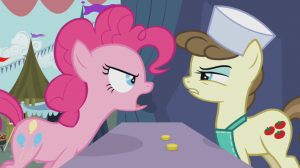
“What are you? New?! The only thing more important than filling the costs of your campaign is setting aside the money to deliver your promises. Your credibility is everything! If you don’t fulfill your promises you will become the Las Pegasus Unicon of Kickstarters, because you spent your gross income and not your net profits!
I didn’t say anything in the Perks section, I didn’t think I had to. When determining how much money you need, actually calculate the costs of:
1. The percentage of how much Kickstarter will take from your income
2. Costs of shipping
3. Costs of materials to make the product
You can only spend the profits on your project. If it’s not enough money, watch this video.
Penultimate part of this e-mail.
Like us and check out our behind the scenes picture and exclusive sketch drawings on our Facebook page: https://www.facebook.com/mlpwritingismagic
“Like us” and “Follow us” is so cliche and audiences are so bombarded with these phrases that we tune them out. Why are you commanding me? Wait but shouldn’t we end our e-mails with a call to action?
Yes, but what good is a call to action that gets tuned out? Let’s look at mine.
You can keep track of our progress and get behind the scenes exclusive pictures on our Facebook page: https://www.facebook.com/mlpwritingismagic
I didn’t make the reader stop paying attention by starting off with Facebook. I started off by saying what the donor could get out of liking our Facebook page. I also never tell them what to do. Make it their idea whether they follow or not. Also simply by using different wording, I make the phrase no longer a cliche. The language is fresh again, and people pay attention.
All best,
Iambic Hexameter (Sharif’s OC)
Sharif’s OC Productions
Phone: (555)555-5555
Email: mlpwritingismagic [at] gmail.com
Website: mlpwritingismagic.com
It’s a great idea to put your information in case someone is impressed with your work and wants to hire you. This is why everything before this is so important. People don’t want to work with someone who is obsessed with themselves; they want to work with someone who makes them feel special.
Which is why I don’t expect the creator of this Kickstarter to reach out to me and go “Hey, Sharif, you were right. Would you like a consultant job on our next crowd fundraising.” Instead I’m expecting, “You know fuck you! How could you write that?” Which is dumb because the former reaction is way more profitable than the latter.
More:
How To Do a Kickstarter: Sharif Acts Like Don Draper on an E-Mail (Public Relations)
How To Do a Kickstarter: Perks
How To Do a Kickstarter: E-Mails
How To Do a Kickstarter (Short Version)
Recommended reading:
How to Win Friends and Influence People (do yourself a favor and avoid the digital age version)

